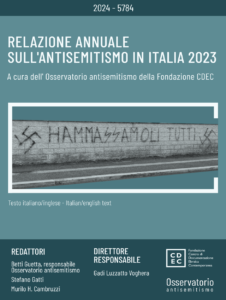Observatory on antisemitism: Insulting Jews is no longer a taboo in Italy
 ““Something has gone wrong in the process of countering antisemitism in Italy.” This is the bitter conclusion drawn by the sociologist Betti Guetta and the researchers of the Observatory on antisemitism of the Contemporary Jewish. Documentation Center – CDEC Foundation in Milan. The above-mentioned conclusion is based on the Annual report on antisemitic incidents and speeches in Italy carried out by the Observatory. The data collected in the 2023 survey are alarming: the number of antisemitic incidents has increased sharply, compared to the past years. Out of 923 reports, last year 454 were identified as incidents: 259 of them occurred online and 195 offline, including one assault and 40 cases of threats. Such figures are overall almost double the amount of the 241 cases identified in 2022.
““Something has gone wrong in the process of countering antisemitism in Italy.” This is the bitter conclusion drawn by the sociologist Betti Guetta and the researchers of the Observatory on antisemitism of the Contemporary Jewish. Documentation Center – CDEC Foundation in Milan. The above-mentioned conclusion is based on the Annual report on antisemitic incidents and speeches in Italy carried out by the Observatory. The data collected in the 2023 survey are alarming: the number of antisemitic incidents has increased sharply, compared to the past years. Out of 923 reports, last year 454 were identified as incidents: 259 of them occurred online and 195 offline, including one assault and 40 cases of threats. Such figures are overall almost double the amount of the 241 cases identified in 2022.
The hatred clearance
“Antisemitism today is much more aggressive and less hidden at the same time. Insulting Jews is no longer a taboo, especially after the wave of hatred triggered by what happened on October 7. We have witnessed the rise of a collective, seemingly freeing feeling: the ongoing conflict in Gaza was used as a shield to insult, without the need to provide any justification,” said Guetta, head of the Observatory. The research has shown that 10% of Italians explicitly express their antisemitism, along with a large grey area of anti-Jewish prejudices. These range from conspiracies about rich Jews pulling the strings of the economy and information, to the image of the vengeful Jew.
The ideological matrix of antisemitism in Italy is mostly extreme-right wing based, flanked by the extreme left-wing, Islamic radicalism, and Catholic anti-Judaism. The number of attacks generally reaches its peaks in conjunction with specific events, such as the pandemic, October 7, some statements by Holocaust survivor and Senator for life Liliana Segre or Secretary of the Democratic Party Elly Schlein, the war in Ukraine and in Gaza.
Long-standing prejudices
“Stereotypes are always the same and, despite the efforts that have been made, they have not become less recurrent,” stresses the Observatory’s head. The web is the place where prejudices that are exploited to attack Israel, to belittle the Shoah and to strike the Jewish minority circulate the most. Specifically, after the massacres carried out by Hamas and the military reaction in Gaza, the false and dangerous identification between Israel-Judaism-Zionism and Nazism has surfaced again and with alarming strength. Such an equation, the CDEC experts point out, allows people to blame the Jews with a clean conscience, regardless of past events. “The events involving Israel always give rise to a bloody antisemitism that recycles (even among secularists) anti-Jewish stylistic features remodelled on the ‘Zionist’ reality, but such peaks of smug savagery have not been reached since 1982.” Such is the situation depicted by the report.
Violated rights
Antisemitism and its escalation “is not just a Jewish problem,” clarifies Stefano Gatti, researcher at the Observatory. “We are talking about citizens who find it difficult, for example, to attend schools or universities because of their identity. That have been attacked by peers or teachers. That saw their constitutional rights violated,” Gatti pointed out. The whole society should rise up against such discriminations. However, “the overall situation is alarming. Beyond the single incidents, we have registered a general pressure on the Jewish world, perhaps not ascribable to antisemitic schemes, but which leads to poisoning the environment and making the lives of individuals more difficult,” added the researcher.
Translated and revised by Claudia Editori and Alida Caccia, students at the Advanced School for Interpreters and Translators of the University of Trieste, trainees in the newsroom of the Union of the Italian Jewish Communities – Pagine Ebraiche.
